
 Review by Jiwon Choi
Review by Jiwon Choi
Frances Donovan’s Arboretum in a Jar is an assertive and confident work in which the poet’s voice feels tautly woven into the cacophony of internal dilemmas and S.O.S mayhem fueling this who’s who in the fairy tale diaspora of our 21st Century.
Donovan, whose previous work explores themes of family, home, sexual/gender identity, and intergenerational trauma, has given us much to consider and untangle in a poetry collection that comes on as a rambunctious coming of age drama set in a Teenage Wasteland. A wasteland that is an interstitial ecology of urban decay and hyper wilderness: the Projects bordered by woods of trees e.g. oak, gingko, apple, hemlock buttressed by the ubiquitous Chinese restaurant and all-night diner, where Poughkeepsie sounds exotic, and there’s a Void:
You don’t find the void,
the void finds you.
But she tries.
The sharp of Scotch
just takes her sideways.
Here the frayed lives of troubled A-list princesses Snow White and Rapunzel take up ample real estate, alongside a gaggle of B-listers with such tongue-in-jowel monikers as Fox News -, Stoner -, and Manic Episode Princess, all struggling to deal with their own off shades of infamy. Stoner Princess puts it best when she says that “she feels like a fish caught in a weir/ A blueberry caught in a mouth.” A condition Anne Carson could be describing when she writes of the “soul trapped in glass,” not entirely the victim but “a slow collusion of Master and victim within one voice.”
And let us not forget the alter ego princess of lower-caps fame, little princess, who is tasked to valiantly face a cadre of ravenous characters on her own: the jackal, the giant eye, and most formidable of all, the father:
little princess reaches up to take his hand
and his cigarette burns her bright pain! the ashy circle pink at the
center
she keeps mum doesn’t know what drunk is
but knows stop whining is the bottle on the counter
She is not quite the well-formed heteronyms of Fernando Pessoa, but perhaps she is a more self-directed intimation of the princesses who are too busy looking for the Void.
Despite all that is going on, it doesn’t take long to feel like you’re being watched––a looming sensation of persistent hovering. Not surprising as there is a constant meeting on the path (à la Little Red) of cast and crew––objects and structures, flesh and bone creatures (did I mention the giant eye!) ready to exact “drops of blood onto snow” (à la Grimm).
Early on Rapunzel, free of the Tower and with the “whole wilderness waiting,” claims she will not search for the prince, but she is “always seeking” nonetheless. And then there’s the time she entered what appeared to be Dante’s First Circle of Limbo, aka the Saw Mill Parkway:
She tries turning off the highway
but the road leads away.
Even in dreams she can’t find her way home.
Sometimes she reaches for the tower,
but there are no walls, just a spiral
And I may sound crazy, but is that tower following us? Uh, yes. Well, at least its representation is. Donovan’s use of the Tower(s) to simultaneously symbolize a structure of habitation/home and menacing/foreboding causes upheaval: the very idea that the place where you live could be out to get you!
If, like me, the Tower harkened you back to the Monolith of 2001: A Space Odyssey, we must be on the same brainwave length. The lore of the Monoliths in the film is that they were built by extraterrestrial beings and placed around us humans for purposes not quite known. Ominous, are these supposed lifeless objects giving off some frenetic energy or signals? Are they trying to control us?
And speaking of control, what kind of freedom is there in the wilderness of an arboretum anyway? An arboretum is meant to be a place for trees and shrubs to be cultivated, labeled for identification; organized in a way to aid their study or growth (Wikipedia).
Cultivated, labeled and organized? Oh, like in a lab? Or in the mainstream society where ideations of female beauty and womanhood are constantly co-opted/manipulated by corporations, media, and other monetizing algorithms in order to squeeze us into glass boxes/towers/jars of unattainable and untenable expectations. Observe how the value of beauty becomes normative restrictions by limiting our personal female freedom; how Society and the Patriarchy coalesce over the degradation of the female form when it comes to constructing roles for women/princesses.
When we get to “The Window,” the last poem of Arboretum in a Jar, we will be “days away from glass towers,” but still behind glass:
It knew her breath –– that window
in the old white Ford
and we may not feel entirely safe:
Her brother’s head on her lap,
no place for her to lie down
she sat vigil all night
but we will have to be okay: [we]breathed the window, coded [our]secrets.
Arboretum in a Jar by Frances Donovan
Lily Poetry Review, 2023, $18 Paper
ISBN 9781957755175
Jiwon Choi is a poet, preschool teacher, and urban gardener. She is the author of One Daughter is Worth Ten Sons and I Used To Be Korean both published by Hanging Loose Press. Choi’s third book of poems will be published by Spuyten Duyvil in 2024. She started her community garden’s first poetry reading series, Poets Read in the Garden, to support local writers. You can find out more about her at iusedtobekorean.com.
